

We would look deeper into how a desirable/ undesirable stimulus could increase or decrease one's behaviour. Operant Conditioning. How Reinforcement and Punishment Modify Behavior Operant conditioning, also known as instrumental conditioning, is a method of learning normally attributed to B.F. Skinner, where the consequences of a response determine the probability of it being repeated. Through operant conditioning behavior which is reinforced (rewarded) will likely be repeated, and behavior which is punished will occur less frequently. By the 1920s, John B. Watson had left academic psychology, and other behaviorists were becoming influential, proposing new forms of learning other than classical conditioning.
Skinner's views were slightly less extreme than those of Watson (1913). The work of Skinner was rooted in a view that classical conditioning was far too simplistic to be a complete explanation of complex human behavior. BF Skinner: Operant Conditioning Skinner is regarded as the father of Operant Conditioning, but his work was based on Thorndike’s (1898) law of effect. Framework of Operant Conditioning. Learning: Negative Reinforcement vs. Punishment.
Reinforcement and Punishment in Psychology 101 at AllPsych Online. Reinforcement The term reinforce means to strengthen, and is used in psychology to refer to anything stimulus which strengthens or increases the probability of a specific response.
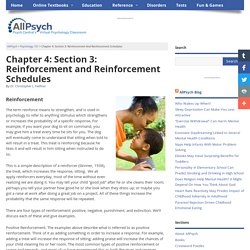
For example, if you want your dog to sit on command, you may give him a treat every time he sits for you. The dog will eventually come to understand that sitting when told to will result in a treat. This treat is reinforcing because he likes it and will result in him sitting when instructed to do so. This is a simple description of a reinforcer (Skinner, 1938), the treat, which increases the response, sitting.
There are four types of reinforcement: positive, negative, punishment, and extinction. Changing Behavior Through Reinforcement and Punishment: Operant Conditioning. In classical conditioning the organism learns to associate new stimuli with natural, biological responses such as salivation or fear.
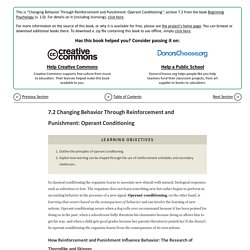
The organism does not learn something new but rather begins to perform in an existing behavior in the presence of a new signal. Operant conditioningLearning that occurs based on the consequences of behavior., on the other hand, is learning that occurs based on the consequences of behavior and can involve the learning of new actions.
Operant conditioning occurs when a dog rolls over on command because it has been praised for doing so in the past, when a schoolroom bully threatens his classmates because doing so allows him to get his way, and when a child gets good grades because her parents threaten to punish her if she doesn’t. In operant conditioning the organism learns from the consequences of its own actions. Positive And Negative Reinforcement (Examples, Punishment) - Parenting For Brain. Reinforcement and punishment are often used as parenting tools to modify children’s behavior.
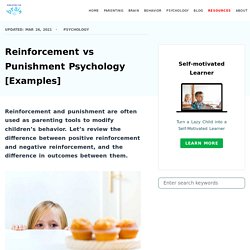
Let’s review the difference between positive reinforcement and negative reinforcement, and the difference in outcomes between them. The Difference Between Positive And Negative Reinforcement In behavioral psychology, reinforcement is the introduction of a favorable condition that will make the desired behavior more likely to happen, continue or strengthen in the future1. Because the favorable condition acts as a reward, reinforcement is a reward-based operant conditioning. What's The Difference Between Positive and Negative Punishment? - North Shore Pediatric Therapy.
In Brief... Operant Conditioning. Reinforcement and Punishment. Learning Objectives Explain the difference between reinforcement and punishment (including positive and negative reinforcement and positive and negative punishment)Define shapingDifferentiate between primary and secondary reinforcers In discussing operant conditioning, we use several everyday words—positive, negative, reinforcement, and punishment—in a specialized manner.
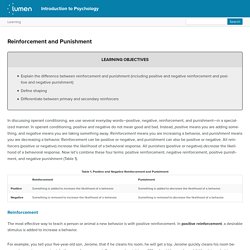
In operant conditioning, positive and negative do not mean good and bad. Instead, positive means you are adding something, and negative means you are taking something away. Reinforcement means you are increasing a behavior, and punishment means you are decreasing a behavior. Reinforcement The most effective way to teach a person or animal a new behavior is with positive reinforcement. For example, you tell your five-year-old son, Jerome, that if he cleans his room, he will get a toy. How Negative Punishment Works. Negative punishment is an important concept in B.
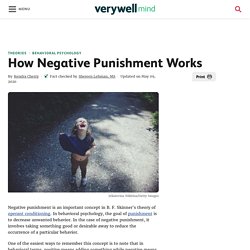
F. Skinner's theory of operant conditioning. In behavioral psychology, the goal of punishment is to decrease unwanted behavior. In the case of negative punishment, it involves taking something good or desirable away to reduce the occurrence of a particular behavior. One of the easiest ways to remember this concept is to note that in behavioral terms, positive means adding something while negative means taking something away.
Parent's implicit use of operant conditioning. Teens May Learn Best with Positive Reinforcement. A new study finds that adolescents focus on rewards and are less able to learn to avoid punishment or consider the consequences of alternative actions.

University College-London investigators compared how adolescents and adults learn to make choices based on the available information. Investigators tracked the way in which 18 volunteers aged 12-17 and 20 volunteers aged 18-32 completed tasks in which they had to choose between abstract symbols. Each symbol was consistently associated with a fixed chance of a reward, punishment, or no outcome.
As the trial progressed, participants learned which symbols were likely to lead to each outcome and adjusted their choices accordingly. Adolescents and adults were equally good at learning to choose symbols associated with reward, but adolescents were less good at avoiding symbols associated with punishment. The study appears in PLOS Computational Biology. “From this experimental lab study we can draw conclusions about learning during adolescence.
How Operant Conditioning Can Affect Adolescent Development. If you've ever wondered how to encourage or discourage behaviors in your adolescent or why some behaviors persist while others disappear on their own, you may benefit from understanding operant conditioning.

If you've ever wondered how to encourage or discourage behaviors in your adolescent or why some behaviors persist while others disappear on their own, you may benefit from understanding operant conditioning. This type of behavior modification employs the concepts of reinforcements and punishments to promote positive behaviors and discourage negative ones. Adolescents can benefit from conditioning naturally or with your help. You can also apply it to your current parenting style as a means to aid your adolescent in adopting the behaviors necessary for his development. Nihms314613. Applying with reference to studies...